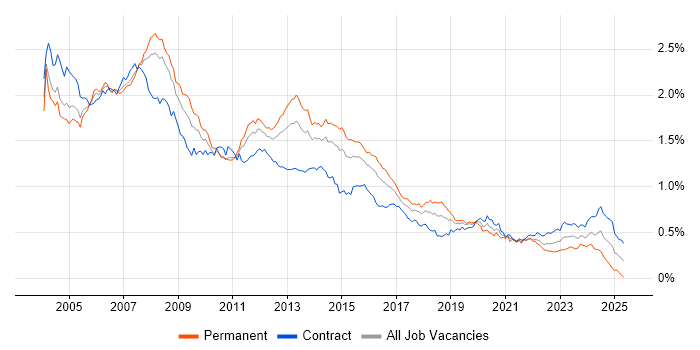Database Administrator
England > London
The median Database Administrator salary in London is £65,000 per year, according to job vacancies posted during the 6 months leading to 31 May 2025.
The table below provides salary benchmarking and summary statistics, comparing them to the same period in the previous two years.
| 6 months to 31 May 2025 |
Same period 2024 | Same period 2023 | |
|---|---|---|---|
| Rank | 390 | 414 | 511 |
| Rank change year-on-year | +24 | +97 | +138 |
| Permanent jobs requiring a DBA | 6 | 87 | 101 |
| As % of all permanent jobs advertised in London | 0.047% | 0.36% | 0.31% |
| As % of the Job Titles category | 0.052% | 0.38% | 0.33% |
| Number of salaries quoted | 6 | 68 | 96 |
| 10th Percentile | £51,875 | £56,250 | £47,500 |
| 25th Percentile | £53,438 | £63,000 | £52,873 |
| Median annual salary (50th Percentile) | £65,000 | £70,000 | £60,000 |
| Median % change year-on-year | -7.14% | +16.67% | - |
| 75th Percentile | £91,563 | £85,000 | £77,500 |
| 90th Percentile | £97,500 | £92,500 | £87,500 |
| England median annual salary | £55,000 | £57,500 | £55,000 |
| % change year-on-year | -4.35% | +4.55% | +4.76% |
All Permanent IT Job Vacancies
London
For comparison with the information above, the following table provides summary statistics for all permanent IT job vacancies in London. Most job vacancies include a discernible job title that can be normalized. As such, the figures in the second row provide an indication of the number of permanent jobs in our overall sample.
| Permanent vacancies in London with a recognized job title | 11,537 | 22,689 | 30,597 |
| % of permanent jobs with a recognized job title | 90.27% | 94.43% | 95.07% |
| Number of salaries quoted | 6,970 | 16,827 | 22,863 |
| 10th Percentile | £41,000 | £37,500 | £42,000 |
| 25th Percentile | £55,000 | £50,750 | £55,000 |
| Median annual salary (50th Percentile) | £75,000 | £70,000 | £72,500 |
| Median % change year-on-year | +7.14% | -3.45% | +3.57% |
| 75th Percentile | £100,000 | £93,750 | £95,000 |
| 90th Percentile | £122,500 | £115,000 | £115,000 |
| England median annual salary | £56,000 | £52,500 | £60,567 |
| % change year-on-year | +6.67% | -13.32% | +0.95% |
DBA
Job Vacancy Trend in London
Job postings that featured DBA in the job title as a proportion of all IT jobs advertised in London.

DBA
Salary Trend in London
3-month moving average salary quoted in jobs citing DBA in London.
DBA
Salary Histogram in London
Salary distribution for jobs citing DBA in London over the 6 months to 31 May 2025.
DBA
Job Locations in London
The table below looks at the demand and provides a guide to the median salaries quoted in IT jobs citing DBA within the London region over the 6 months to 31 May 2025. The 'Rank Change' column provides an indication of the change in demand within each location based on the same 6 month period last year.
| Location | Rank Change on Same Period Last Year |
Matching Permanent IT Job Ads |
Median Salary Past 6 Months |
Median Salary % Change on Same Period Last Year |
Live Jobs |
|---|---|---|---|---|---|
| Central London | 0 | 1 | £52,500 | -22.22% | |
| DBA England |
|||||
DBA Skill Set
Top 30 Co-occurring Skills and Capabilities in London
For the 6 months to 31 May 2025, DBA job roles required the following skills and capabilities in order of popularity. The figures indicate the absolute number co-occurrences and as a proportion of all permanent job ads across the London region featuring DBA in the job title.
|
|
DBA Skill Set
Co-occurring Skills and Capabilities in London by Category
The follow tables expand on the table above by listing co-occurrences grouped by category. The same employment type, locality and period is covered with up to 20 co-occurrences shown in each of the following categories:
